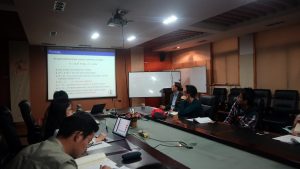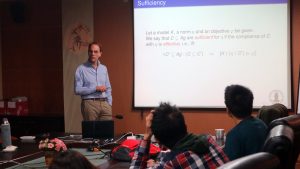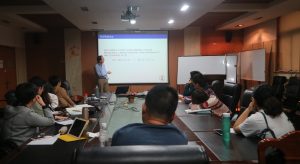Thomas Ågotnes: Coordinating Multi-agent Systems using Social Laws [2018-4-12]
西溪逻辑论坛第79期
 Date: 12th April 2018 (15:30-17:30)
Date: 12th April 2018 (15:30-17:30)
Venue: Room 229, Administration Building, Xixi Campus, Zhejiang University
Speaker: Prof. Thomas Ågotnes (University of Bergen & Zhejiang University)
Title: Coordinating Multi-agent Systems using Social Laws
Abstract: Social laws (or normative systems) have emerged as a natural and powerful paradigm for coordinating such systems, exposing the whole spectrum between fully centralised and fully decentralised coordination mechanisms. A social law is, intuitively, a constraint on the behaviour of agents, which ensures that their individual behaviours are compatible. In a standard multi-agent state transition diagram (where transitions are labelled with the name of the agent effecting the transition), a social law is simply a labelling of the transitions saying whether or not they are “legal”, or “desirable”. An illegal transition could, for example, correspond to a component malfunctioning. Different normative systems give rise to different global system properties, assuming that the social law is complied with. Such properties can be specified and analysed in temporal modal logic. However, it might be that not all agents/components comply, either deliberately or because of a malfunction. In the talk I will, in addition to introducing and motivating the idea of social laws, discuss (non-)compliance from two angles. First: when is it rational for an agent to comply? Since the properties of the resulting system depend on compliance of all the agents in the system (think of the norm “drive on the right side of the road”), this requires a game theoretic analysis. Second, how can we identify the most important agents/components in the system, the agents whose compliance is crucial for the proper functioning of the system? I will talk about some resulting decision problems, combining logic, game theory, voting theory and complexity theory.
*This talk is supported by the PME (Philosophy, Mathematics & Economics) Program, Haining International Campus,Zhejiang University





